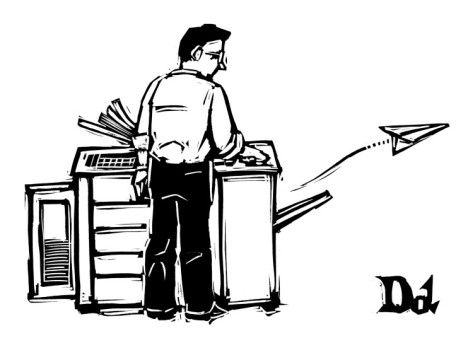
(This is a cross-post from the GetDimples.com blog on January 2, 2013.)
As we build our products and talk with folks about what Dimples does, occasionally we get a question about the digitization, or ‘paperless office’, movement. Curiously, the ideal of a paperless office has been around for about forty years, coinciding with the huge growth in print consumption, including paper, ink, and toner.
Yesterday it was announced that there is a Paperless Coalition, a group of digital service providers, including Google Drive, HelloFax, HelloSign, etc., who have started a campaign promoting their services as both saving money and having less environmental impact compared to paper-based services. We use or have used some of these services. As a geographically dispersed and tech-hugging team, we embrace some of these services. Yet, the Paperless Coalition announcement and website have a scent of marketing-speak. There are other concerns, as well. A number of folks on Hacker News, for example, are skeptical of the environmental impacts of paper/ink vs. servers/PCs.
- It’s known that paper requires trees and ink/toner requires chemicals. Paper, ink, and toner can be expensive, too. Kai touched on these in earlier posts. But printed documents have proven reliability, up-time, and resiliency. That’s why Dimples helps you to stay with what works, while reducing your unnecessary usage in a controlled, reliable way.
- There is an increase in the public awareness of the extraordinary amounts of electricity consumed (often from dirty power sources) and carbon gasses emitted by server farms that power the Internet, as well as the hazardous chemicals (PDF) contained in consumer computers and mobile devices. It’s relatively common for cloud-based systems to fail, too.
It seems that there is no clear evidence to suggest that digital is better than paper, or vice-versa. What is clear is that, rather than pursuing the ideal of a paperless office, organizations are likely to succeed by pursuing a future in which digital and paper tools “work in concert and organization processes make optimal use of both”. (See Abigail J. Sellen’s and Richard H. R. Harper’s book, The Myth of the Paperless Office, from The MIT Press) As I wrote on HN:
…even with leading electronic record systems, paper will continue to be heavily used for producing backups, permanent copies, changelogs, etc. For example, a large regional hospital network with a state-of-the-art electronic patient record system generates a lengthy paper backup for each change made to the e-record. The system produces ~100,000 pages a month for just patient record changes. And this is considered an “all digital” system. Hmm.
What appears to be happening is a fusion of both paper and digital as a best practice. Important information is recorded digitally because it is fast and convenient, and also recorded in analogue, on paper, to leave a legal trail and backup for when the electronic systems go down (and they do go down).
For more discussion on this topic, read the comments at HN.

